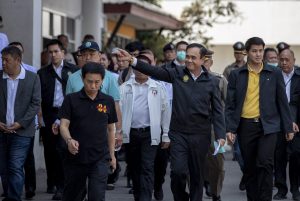Thailand’s prime minister and five of his fellow Cabinet members on Friday defeated non-confidence motions filed against them in Parliament.
All six managed to gain votes of approval from more than half the 500 members of the House of Representatives, while many opposition members boycotted the vote.
It was the first no-confidence motion Prime Minister Prayuth Chan-ocha has faced since he became Thailand’s leader after staging a military coup in 2014. He ruled with absolute authority until an election last year, when he was elected as prime minister in parliamentary vote under electoral rules his junta had commissioned.
Friday’s vote is expected to give a slight boost to the stability of his government, which has faced criticism for failing to effectively deal with economic troubles, as well as a serious air pollution problem and the health threat from the new coronavirus that first emerged in China.
But moves to defang the Parliamentary opposition, resulting in a court dissolving a popular progressive opposition party, seem to have emboldened student critics of his rule, who have been staging spirited rallies across the country this week calling for greater democracy.
The motion of no-confidence against Prayuth was defeated when 272 lawmakers gave him a vote of approval, while 49 voted to censure him. Two lawmakers abstained.
Deputy Prime Minster Prawit Wongsuwan was the biggest government vote-getter, with 277 MPs voting in his favor, while 50 cast votes of no-confidence.
Deputy Agriculture Minister Thammanat Prompao fared worst among the six, with 269 lawmakers approving his record, while 55 backed the censure motion and another seven abstained.
The opposition had publicized documents showing Thammanat had been imprisoned for four years in Australia in the 1990s for his part in smuggling heroin into that country. The conviction had been revealed last year ahead of his appointment to Prayuth’s Cabinet.
Thammanat insists the affair is a misunderstanding and he did not serve the sentence in an Australian prison, despite considerable evidence to the contrary.
The boycott of Friday’s vote was led by the main opposition Pheu Thai Party, which with several other small parties walked out ostensibly to protest that the censure debate had not been extended.
Other opposition members, however, accused Pheu Thai of conniving with the government side to limit the debate.
Members of what had been the Future Forward Party accused Pheu Thai of arranging to have one of its MPs run down the clock before it could present its complete case against some of the Cabinet members under scrutiny.
The Future Forward party had been the third biggest party in Parliament until it was dissolved by court order last week for violating election law by taking a large loan from its leader.
The allegation against Pheu Thai was made by Future Forward’s former secretary-general, Piyabutr Saengkanokkul
Piyabutr and the party’s other executive board members were banned from political office for a decade, while its other lawmakers have been allowed to keep their seats but must join another party within 60 days. Most are expected to join a new party established to replace Future Forward, but several have crossed over to the government’s side.

































